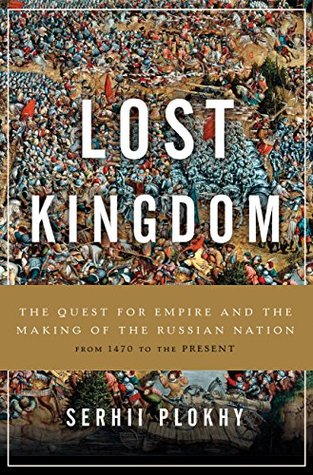More on this book
Kindle Notes & Highlights
Read between
July 15 - July 21, 2023
It also had the unintended effect of increasing the importance of the Ukrainian clergy in the Russian Orthodox Church. Although the authorities closed Orthodox churches en masse in the traditionally Orthodox regions of Russia, Ukraine, and Belarus, they were much more careful in western Ukraine, where excessive pressure might well have caused believers to abandon government-controlled Russian Orthodoxy and join the “nationalist” Ukrainian Catholic Church, which maintained an underground existence. Most of the approximately 8,000 parishes of the Russian Orthodox Church that survived
...more
The first, which preceded his consolidation of power in Moscow in 1957, was marked by the appeasement of republican elites. During this period, the republican elites received greater administrative and economic freedom than they had possessed under Stalin, with the creation of republican ministries and regional economic councils that reduced central control over economic decision-making. In Ukraine, the second Soviet republic, the share of industrial enterprises under republican control increased from 34 to 97 percent. The republics also were given more freedom to establish their own cultural
...more
This highlight has been truncated due to consecutive passage length restrictions.
What differentiated the Ukrainian situation from the Belarusian one was the role played in cultural policy by the former Polish territories annexed to the two republics on the basis of the Molotov-Ribbentrop Pact of 1939 and sanctioned by the Western powers at Yalta in 1945. The Ukrainians in Galicia, Volhynia, and, to a lesser degree, in formerly Romanian Bukovyna and Czechoslovakian Transcarpathia had a highly developed national identity that retarded the pace of Russification there and in other parts of the republic. The integration of the Ukrainian west required major cultural concessions
...more
It was a palace coup carried out by conservative elements in the party and state leadership who believed that Khrushchev’s reforms were threatening the stability of the regime.
By the early 1970s, Brezhnev had made the concept of the Soviet nation the centerpiece of his nationality policy.
The marginalization of non-Russian languages and their elimination from the educational system began in 1970, when a decree was issued ordering that all graduate theses be written in Russian and approved in Moscow. In 1979, the authorities organized an all-Union conference in Tashkent on ways to improve Russian-language instruction; beginning in 1983, bonuses were paid to teachers of Russian in schools with non-Russian-language instruction. Cultural Russification was being intensified, as the future of the Soviet nation-building project depended on its success.
All of them were driven by loyalty not to the Soviet land or nation but to their republic’s nation and identity. While the party was building one Soviet nation on the basis of the Russian language and culture, the writers organized themselves on the basis of national languages and defined their concerns in ethnocultural terms.
The first group, closely associated with the literary journal Molodaia gvardiia (The Young Guard), was characterized by a conservative and antiliberal brand of Russian nationalism. Its members decried the fate of the Russian village and culture but also praised the idea of a powerful state and promoted thinly veiled anti-Semitism. Russian liberals, for their part, rallied around their own journals, the most prominent of which was Novyi mir (The New World): while publishing “village prose,” it maintained an antinationalist stance.
The rapid economic development of Soviet Belarus, a former backwater of Poland and imperial Russia, on Masheraŭ’s watch in the 1960s and 1970s made loyalty to the Soviet regime a basic component of the new Belarusian identity.
turning the history of partisan resistance to the Nazis into a founding myth of the Soviet Belarusian nation. Unlike the Ukrainians, who looked with pride to the times of Kyivan Rus’ and the Cossack Hetmanate, the Belarusians lacked a founding myth of their own and readily accepted the all-Soviet mythology of the Great Patriotic War.
The old Soviet Union had long run out of new ideas. By the mid-1980s, it had also run out of leaders committed to maintaining old ideological, economic, and social models.
The immediate and most obvious challenge before him was the sorry state of the Soviet economy, which was in free fall.
leader had to do with the loss of legitimacy by the ruling party and its elite. The communists ruled the country not only by means of terror and coercion but also with the promise of a brighter future. That future was called the attainment of communism, which in the popular mind meant an abundance of food and consumer goods. Khrushchev had promised the advent of that paradise in the early 1980s. With no communism in sight and the economy in decline, faith in the coming paradise and its prophets hit bottom. In promising a communist future, the authorities had contrasted the achievements of the
...more
Gorbachev had to act quickly to deal with the crises of the economy and political legitimacy at home and the economic, ideological, and military competition abroad, now all but lost by the USSR.
He began his offensive against the old system on two fronts, introducing elements of private property and the market in Soviet economic space and opening political space for debate. For Gorbachev and his liberal advisers, the two fronts were interrelated, and victory on one was impossible without victory on the other. As the party’s old guard resisted economic change, Gorbachev used political reform to soften up or crush his opponents. The key component of perestroika was the notion of glasnost, or openness—a series of measures that lifted restrictions on political debate and made party
...more


